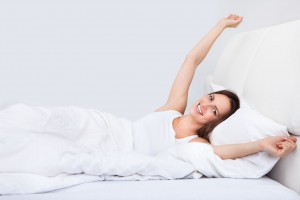 Professor Russell Foster is a circadian neuroscientist – he is a sleep expert and he studies about sleep and the sleep cycles of the brain. In a recent lecture on sleep at The Royal Society in London, Professor Foster claims that bright fluorescent bathroom lights disrupt the body getting ready for sleep. He believes that by simply brushing one’s teeth in the dark or in dim lighting, the body will be able to allow sleep to take hold more quickly, and hence, get a better night’s rest.^
Professor Russell Foster is a circadian neuroscientist – he is a sleep expert and he studies about sleep and the sleep cycles of the brain. In a recent lecture on sleep at The Royal Society in London, Professor Foster claims that bright fluorescent bathroom lights disrupt the body getting ready for sleep. He believes that by simply brushing one’s teeth in the dark or in dim lighting, the body will be able to allow sleep to take hold more quickly, and hence, get a better night’s rest.^
The lack of sleep or a poor night’s rest can have many detrimental effects on health. Besides reduced cognition and creativity, obesity, diabetes, cancer and mental illness have been linked to reduced sleep.
While brushing in dim light or in the dark may be an act that helps in a good night’s rest, it may not be so great for your oral health. We like to make sure that when we brush, we can see clearly to make sure we get into all the nooks and crannies in the mouth. After all, it is precisely these areas that tend to be food traps and cause the most problems. Moreover, it may be really tough to floss in the dark!
The best time to brush your teeth is actually 30 minutes after a meal, especially if your meal consists of acidic foods/ drinks. Brushing immediately after meals can damage enamel weakened by acidic foods/ drinks. Waiting for at least 30 minutes gives time for enough saliva to neutralize the acidity in your mouth. Taking too long after meals to brush is also not recommended, as it may mean the bacteria already has time to start wreaking havoc on your teeth.
Ideally, one should have dinner at least three hours before bed time and avoid any late-night snacks. Hence, brushing your teeth 30 minutes after dinner, with your regular bathroom lights on, should still leave your body with plenty of time to get into ‘sleep mode’. Remember to include flossing into your daily oral regime as well. Now all you have to do to maintain great oral health is to make sure you follow the golden rule of 2-2-2; brush your teeth at least 2 times a day for 2 minutes each time, and visit the dentist 2 times a year.
Please subscribe to our blog for more interesting dental related topics or ‘Like’ our Facebook page for the latest updates on our team activities.
^ Brush your teeth in the dark to help sleep, says Oxford University neuroscientist (http://www.telegraph.co.uk/news/science/science-news/11966259/Brush-your-teeth-in-the-dark-to-help-sleep-says-Oxford-University-neuroscientist.html)





